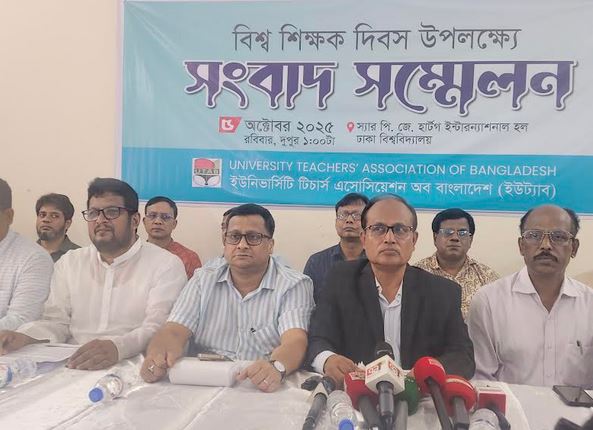News Flash


DHAKA, Oct 5, 2025 (BSS) - The University Teachers' Association of Bangladesh
(UTAB) today placed a 12-point demand, including the implementation of a
balanced and dignified pay structure, equal professional opportunities, and a
research- and education-friendly environment for teachers at all levels.
Marking World Teachers' Day 2025, celebrated under the theme "Teaching
Profession: The Brilliance of Collective Effort," UTAB leaders made the call
at a press conference at Sir P.J. Hartog International Hall of Dhaka
University, urging the government to address long-standing disparities and
ensure the dignity and security of teachers nationwide.
UTAB President Prof Dr ABM Obaidul Islam placed the demands, while its
Secretary General Professor Morshed Hasan Khan, Treasurer Professor Abul
Kalam Sarkar, Vice Chancellor of Jahangirnagar University Professor Kamrul
Ahsan, Pro-Vice Chancellor of National University Professor Lutfar Rahman,
Vice Chancellor of Pabna University of Science and Technology Professor Sohag
Awal, and other central and regional leaders were present.
In a written statement, UTAB President and Vice-Chancellor of Bangladesh Open
University Professor Dr ABM. Obaidul Islam said this year's theme, "The
Teaching Profession: The Glow of Collective Effort" reflects the global
commitment to uphold the dignity and professional rights of teachers.
He said, however, teachers in Bangladesh-from primary schools to
universities-continue to face professional devaluation and financial
hardship.
UTAB key demands include implementing a balanced and dignified pay structure
for teachers at all levels; ensuring a transparent and updated promotion
system; providing international-standard training, research opportunities,
and digital skill development; reducing administrative burdens so teachers
can focus on teaching; introducing a universal pension scheme for all non-
government teachers; and ensuring timely payment of retirement benefits and
dues.
UTAB also demanded the introduction of a distinct and higher pay scale for
university teachers aligned with international standards, provision of
research allowances, and financial incentives for presenting research papers
at national and international conferences. They called for incentives to
encourage publication in quality journals and recognized research books.
Other demands include ensuring job security, fair pay, and enhanced research
opportunities for teachers at private universities, guaranteeing academic
freedom, and fostering a teaching- and research-friendly environment across
campuses.
UTAB urged both government and social initiatives to ensure teachers'
dignity, workplace security, and elimination of professional uncertainty.
UTAB president ABM Obaidul said, "Teachers at the primary and secondary
levels bear the fundamental responsibility of building the foundation of
education, yet their pay remains at the lower end of the national scale."
Government primary school teachers are appointed in the 13th grade of the
national pay scale, which is the lowest among South Asian countries, he
added.
He further said teachers in non-government MPO-listed institutions suffer
from severe disparities in salary and benefits compared to their counterparts
in government institutions.
About 97 percent of secondary education in the country is conducted through
non-government schools, where teachers are often forced to live with
financial uncertainty. No universal pension scheme has yet been introduced
for teachers in non-government institutions, he added.
He also pointed out that teachers in non-government colleges under the
National University offering honours and master's courses are still outside
the MPO facilities, calling it a "grossly discriminatory policy."
Teachers at primary, secondary, and college levels, he said, not only lag
behind other government officials with similar qualifications in financial
benefits but also face extreme discrimination in the promotion process.
Many remain in the same position for years without timely promotion due to
bureaucratic complexities. Opportunities for training in modern teaching
methods, digital learning technologies, and research are also very limited,
he said.
Dr. Obaidul Islam said although university teachers are the main architects
of higher education, they lag behind other government cadres in financial
benefits. Due to inadequate research funding, even qualified teachers and
researchers lack opportunities to conduct world-class research.
He alleged that the autonomy of universities was undermined during the tenure
of the previous "fascist government," which also destroyed the environment
for free intellectual practice. Many teachers, he said, were victims of
political harassment, losing their promotions or even jobs.
"Building an education- and technology-based, research-oriented, and morally
conscious knowledge society is the foundation of sustainable development, and
teachers are the key architects of such a society.
But today, teachers in Bangladesh are frustrated due to economic hardship and
professional devaluation," he said, urging the government to address the
situation by fulfilling their 12-point demand.